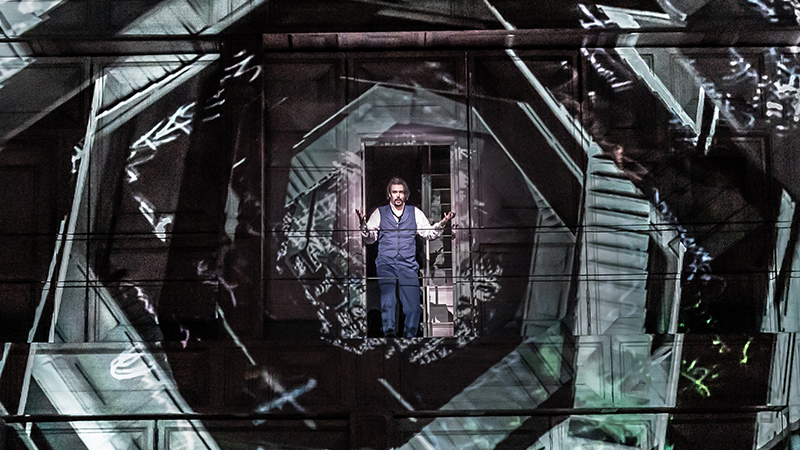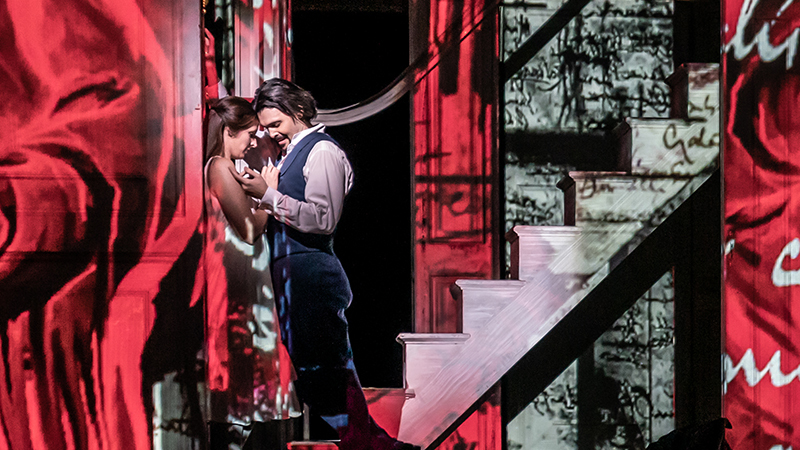-
10 Things to Know about DON GIOVANNI
By COC StaffPosted in 23/24 Season
Mozart’s dark masterpiece Don Giovanni lands this season at the COC in a breathtaking production from Danish director Kaspar Holten, helmed by revival director Amy Lane. Embracing comic, tragic, and supernatural plot elements, and by turns musically thrilling, elegant, and witty, it’s no wonder that Don Giovanni is widely regarded as one of the greatest operas of all time.
Read on to learn 10 Things to Know about Don Giovanni—just be prepared for spoilers!
BUY TICKETS
In briefMozart’s Don Giovanni, a serial womanizer, makes a fatal mistake when he kills the father of his latest conquest, Donna Anna. Unrepentant to the end, he is ultimately forced to confront the ghost of the dead man and gets his just reward.A triumph from the start
Hot off the success of The Marriage of Figaro, Mozart was commissioned by Prague’s National Theatre (now Estates Theatre) to write a new opera. Don Giovanni was the result, and Mozart himself conducted its 1787 premiere to a rapturous reception.A long history
The Spanish legend of the libertine Don Juan, which inspired the plot of Mozart’s opera, has been retold in various forms across literature and music from the early 1600s. The earliest written version was a play by Tirso de Molina titled El burlador de Sevilla y convidado de piedra (The Trickster of Seville and the Stone Guest), published around 1630. In this version, Don Juan is clearly identified with the devil for his shape-shifting abilities.
Life imitating art?
Don Giovanni’s librettist, Lorenzo Da Ponte (who also wrote librettos for Mozart’s The Marriage of Figaro and Così fan tutte) was also a bit of a playboy in his youth. While living in Venice in his twenties, he was known to have carried on numerous love affairs. When one entanglement with a married woman became the stuff of scandal, he was banished from the city for 15 years on charges of “bad living.”

Casting changesIn the earliest productions of Don Giovanni, the roles of the peasant Masetto and the murdered Commendatore were played by the same (bass) singer; nowadays, however, they are generally cast with two different performers.
People really liked itThe novelist Gustave Flaubert called Don Giovanni, along with Shakespeare’s Hamlet and the sea, “the three finest things God ever made.” Composer Charles Gounod described the opera as “a work without blemish, of uninterrupted perfection.” And the philosopher Søren Kierkegaard wrote that “among all classic works, Don Giovanni stands highest.”
Making overtures
Mozart is said to have composed the overture while suffering a hangover the evening before the premiere—and legend has it that the ink on the score was still wet on opening night. The composer also reputedly boasted that it took him just three hours to finish the piece, in which the foreboding opening chords foreshadow the entrance of the vengeful ghost towards the end of the second act.The Catalogue Aria
One of Mozart’s most famous and popular arias is “Madamina, il catalogo è questo” (“My dear lady, this is the list”), which is performed by Don Giovanni’s servant Leporello in Act I. Popularly known as the Catalogue Aria, the piece is at once comic while containing—to modern ears, at least—sinister undertones. Leporello lists the number and qualities of his master’s romantic conquests, informing the rejected Elvira that Don Giovanni has seduced 1,003 women in Spain alone (the final tally, going by the figures quoted in the aria, ends up numbering 2,065).
Musical highlights
The ballroom scene at the end of Act I is a virtuosic achievement in which Mozart features two on-stage instrumental groups, each playing in its own metre, in synchronization with the main orchestra. Many operagoers will also recognise the melody of “Là ci darem la mano” (“There we will join our hands”), which puts on full display Don Giovanni’s skill at the art of seduction. The duet begins with Don Giovanni and Zerlina singing in alternating verses and ending in unison, as Zerlina appears ready to succumb to Giovanni’s enticements.
Hero or villain?
Just who is Don Giovanni: a rebellious individualist who flouts the religious and social conventions of his time, or a demonic villain who gets his just desserts? This season’s production suggests that the answer may be more complex, with a kinetic set design that highlights the spiralling of a tortured conscience, and performances that point to the power of words to seduce, ensnare, and reinvent. Join us this winter, and judge for yourself!
Don Giovanni opens February 2 at the Four Seasons Centre for the Performing Arts!
BUY TICKETS
Photos: Marc Brenner
_20240704163452_0.png)